Iranian American Group Asks Blinken To Change Iran Policy, Personnel
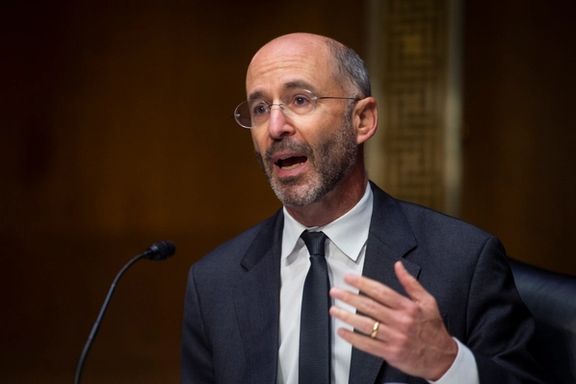
An Iranian American community organization has called on the Biden Administration to reassess US Iran policy and State Department team in charge of that policy.

An Iranian American community organization has called on the Biden Administration to reassess US Iran policy and State Department team in charge of that policy.
The National Union for Democracy in Iran (NUFDI) sent a letter to US Secretary of State Antony Blinken October 11, asking the Administration “to reassess its prevailing policy toward Iran and the team of diplomats tasked to implement it.”
NUFDI argues in the letter that current protests show Iranians are determined to change the clerical regime and US policy is outdated and does not address the current reality.
The letter specifically asks Blinken to consider replacing US Special Envoy for Iran Robert Malley and his deputy Jarret Blanc who “have focused their efforts almost exclusively on securing a new nuclear accord” with Iran. It added that they “have not only failed to achieve this objective; they have also largely ignored every other US foreign policy” consideration.
President Joe Biden’s appointment of Malley who was one of the Obama era officials responsible for negotiating the 2015 Iran nuclear deal, JCPOA, has always been controversial among those who consider the accord as deficient and incompatible with US national interests.
The letter asks Blinken to “reformulate” Iran policy basing it on human rights and democracy, “limit allocation of resources” for achieving a nuclear deal, appoint a US Special Representative to the Iranian people, implement new sanctions and “devise…measures to provide material support to the Iranian people.”
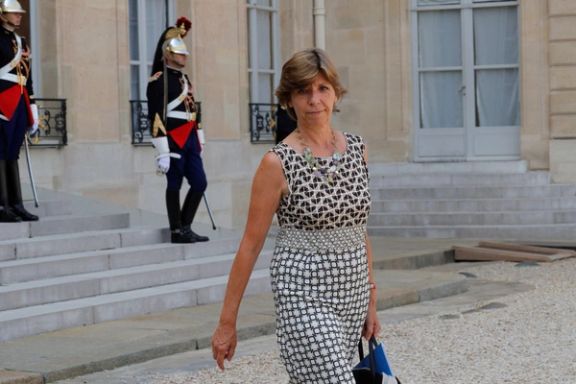
French Foreign Minister Catherine Colonna said Tuesday Paris was pressing Iran to free detained nationals, confirming five were currently held.
“I hope to speak to the Iranian foreign minister today to ask once again for the immediate release of all our compatriots,” Colonna told France Inter radio. The minister said she expected a meeting of European Union foreign ministers October 17 to “validate” a set of sanctions against Iran targeting those “behind the repression.”
France Monday advised nationals against going to Iran for any reason and directed those there “to limit their movements…to imperatively avoid any type of gathering and to make themselves known to the French Embassy in Tehran.”
The five French detainees include Cecile Kohler, a trade union leader, and her partner Jacques Paris, who were arrested in May, accused of involvement in teachers’ protests seeking higher pay, and whose ‘confessions’ aired last week on an Iranian state television station. The pair said they were in Iran on holiday. A trailer on the Arabic-language Al-Alam station said they had arrived with “packets of money.”
Also in jail is French-Iranian researcher Fariba Adelkhah, arrested 2019 and sentenced to five years in prison for “undermining national security.” Another French citizen, Benjamin Briere, was arrested in May 2020 and sentenced to eight years and eight months for espionage, without due process of law.
‘Adhere to the rules’
After the recent outbreak of protests following the September 16 death of Mahsa Amini after her arrest in Tehran by ‘morality police,’ Iran said late September it had detained nine foreign nationals linked to unrest, including those from France, Germany, Italy, Poland and the Netherlands.
Foreign Ministry spokesman Nasser Kanaani said Monday that foreigners “should adhere to the rules and regulations and not enter into issues that are basically not within the scope of the normal travel of foreign citizens.”
The French embassy in Tehran Tuesday announced delays in processing visa applications from Iranians due to “the internet filtering the Iranian authorities have decided to do.” Harmatullah Rafiei, head of a leading tourism association, had earlier suggested some European embassies had suspended processing Schengen visas. Iran argues that social media has been used by foreign-based groups to foment violence including attacks on ambulances.

‘Brutal suppression’
The European Union has as yet given no indication of what sanctions may be agreed at the foreign ministers’ meeting October 17. German Foreign Minister Annalena Baerbock told Bild am Sonntag, a Sunday newspaper, that Berlin would support measures freezing the assets and banning the EU entry of those responsible for “brutal suppression,” referring to antigovernment protests.
While Baerbock did not name any persons or organizations, the United Kingdom announced Monday it was sanctioning Iran’s ‘morality police,’ the police’s national head Mohammad Rostami and its Tehran chief Ahmad Mirzaei, and well as national police chief Hossein Ashtari and other officials, whom it accused of “serious human rights violations.” Tehran summoned the British ambassador Monday evening to protest over ‘interference in internal affairs.’
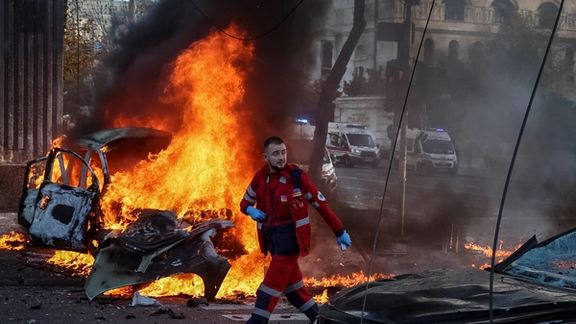
President Volodymyr Zelensky said Monday Russia had used Iran-made drones responding to Saturday’s attack on the Kerch bridge linking Crimea with the mainland.
After explosions in several Ukrainian cities Monday morning, ending months of calm in Kyiv and reportedly killing at least eight in the capital, Zelensky gave a video address on social media. “This morning is difficult,” he said. “We are dealing with terrorists. Dozens of missiles and Iranian Shaheds. They have two targets: energy facilities throughout the country…[and] people. There may be temporary power outages now, but there will never be an interruption in our confidence – our confidence in victory.”
Russian President Vladimir Putin said Sunday the truck-bombing of the Kerch bridge, Europe’s longest and linking Russian-held Crimea to the mainland, was “a terrorist act” organized by Ukrainian intelligence agents and “aimed at destroying critical Russian civilian infrastructure.”
Zelensky’s claims over Iranian drones were the latest from Ukrainian leaders. Last week Oleksiy Kuleba, head of the Kyiv military administration, said six explosions 75km south of Kyiv in a military base at Bila Tserkva were caused by Iranian-made Shahed-136 delta-wing ‘kamikaze’ drones.
‘Cheap alternative’
Ukrainian officials had earlier suggested the drones offer Moscow an easily-assembled, cheap alternative to high-precision missiles or piloted air raids, although Nataliya Gumenyuk, a spokeswoman for the Ukrainian military command, recently told AFP news agency the Shahed-136’s effectiveness was “very low”. In the Bila Tserkva attack, six drones were shot down, while another six crashed into buildings, injuring one soldier.
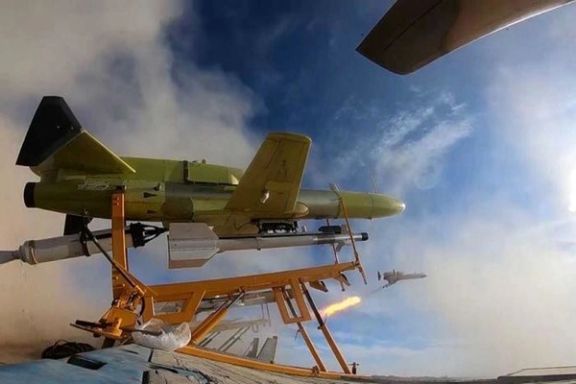
Tehran has denied supplying drones to Russia. Iran foreign ministry spokesman Nasser Kanaani last week said media reports were “baseless.” US National Security Advisor Jake Sullivan claimed July Iran had agreed to supply drones to Russia, a warning repeated by officials several times. In September, the US imposed sanctions on several companies for helping or facilitating the drone transfers to Russia.
Ukraine is also lobbying for increased supplies of US weapons. Politico reported Monday that discussions on air-defense batteries would “loom large at the US-led Ukraine Defense Contact Group… in Brussels later this week.” Ukraine’s Defense Minister Oleksii Reznikov said “the best response to Russian missile terror is the supply of anti-aircraft and anti-missile systems to Ukraine” so as to “protect the future of Europe.”
Ukraine seeks Israeli arms as rhetoric escalates
Ukraine is also keen to source arms from Israel, a top-ten global weapons exporter and the Middle East’s main drone producer alongside Turkey. While Ankara has supplied Ukraine since 2019 with the advanced Bayraktar TB-2drone, Israel has been reluctant to arm Ukraine due to its generally good relations with Russia, a situation Zelensky claimed in September had left him “in shock.” With parliamentary elections due November 8, Israeli politicians are also wary of alienating the Russian-speakers m around 15 percent of voters.
In a further sign of possible escalation in the ten-month Russia-Ukraine conflict, Belarusian President Alexander Lukashenko said Monday he had ordered troop deployment alongside Russian forces near Ukraine in response to what he said were planned Ukrainian “strikes” on the territory of Belarus. The Ukrainian military claimed Saturday Russia had deployed Iranian drones in Belarus.
“Tell the president of Ukraine and the other lunatics: if they touch one meter of our territory then the Crimean Bridge will seem to them like a walk in the park,” Lukashenko said.
Justifying Russia’s actions in a televised address, Putin said Russia would respond again if Ukraine hit Russian territory. “The Kyiv regime, with its actions, has put itself on the same level as international terrorist organizations… To leave such acts without a response is simply impossible.”
Russia has also threatened the use of tactical nuclear weapons in Ukraine. Zelensky October 6 called for “preemptive strikes” by Nato so that Russia knew “what will happen to them if they use it,” leading to Russian charges that the Ukrainian president wanted to turn the conflict nuclear.

Iran’s Supreme Leader Ali Khamenei has called on sportsmen to adhere to “religious beliefs,” reiterating that not competing with Israeli athletes is a victory.
He made the remarks about a month ago in a meeting with families of the “martyred” athletes but was published by its official website on Monday.
Deprivation of athletes of medals due to a ban on competing with the representatives of “the Zionist regime” is actually a victory because competing means recognizing the regime, he noted.
There is no legislation banning athletes but under pressure from federation officials, they usually lose games intentionally, forfeit matches or claim injury to avoid facing Israelis. Khamenei has often praised Iranian athletes who refuse to play against Israelis, and in September 2021 said they should continue to do so even if facing punishment by international sports bodies.
About 30 Iranian athletes in recent years have defected from Iranian national teams and sought asylum in other countries, including Judo champion Saeid Mollaei, Greco-Roman national team wrestler Ali Arsalan, and many others.
Pointing to the prominent role of popular sport figures in different strata of society, Khamenei said observance of religious teachings by the athletes and sports managers has a great social and spiritual impact on people. There is no Muslim religious rule against competing with Israelis.
Amid widespread protests by the Iranians against Khamenei, the government, and the Islamic regime, many officials are trying to boost the discourse of theocracy in the society.

Amid ongoing crisis in Iran ‘reformist’ commentator Abbas Abdi has said in an interview that what Iran's state-run television broadcasts is sheer propaganda."
Those who are looking for news in Iran will not turn to the state TV, Abdi argued.
Ironically, when hackers interrupted the state TV news program October 8, playing a short clip, most Iranians found out about it through social media reports or on foreign-based satellite TV rather than watching the actual program on the state TV.
Meanwhile, former Vice President Mostafa Hashemi Taba has argued in another interview that the state TV, also known as the Islamic Republic of Iran's Broadcasting organization (IRIB) excels in keeping Iranians uninformed about developments. He added that Iranians no longer trust the state television and the officials who appear on TV.
"When the television broadcasts what only a tiny segment of the population believes, others will inevitably turn their TV sets off and turn their backs to it."
Meanwhile, former IRIB Chief Mohammad Hashemi also criticized IRIB for airing the news only after they have been broadcast on foreign-based satellite channels. Nonetheless, he praised the state TV for countering lies and rumors, without citing an example.
According to Didban Iran [Iran Monitor] website in Tehran, the activity of IRIB's deputy chief for political affairs, which is in charge of news has been reduced to responding to information programs that foreign-based Persian media broadcast about Iranian developments.
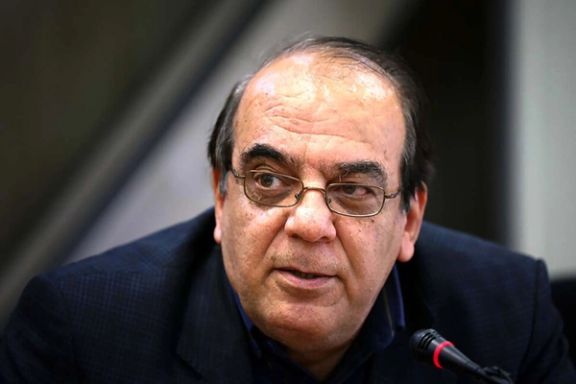
IRIB is directly controlled by Supreme Leader Ali Khamenei’s office, especially its news and political programming.
The state broadcaster usually repeats what has already been aired during previous hours and sometimes days, adding a spin to please the organization's management and its supreme chief, Khamenei.
During the three weeks since the start of antigovernment protests in Iran, IRIB's most eye-catching output was showing the half-naked image of an Iranian protester abroad, for which the organization was forced to apologize later. It was meant to help the regime’s cause by discrediting protesters, but it touched a raw religious nerve among some insiders.
IRIB’s penchant for one-sided news has deeply annoyed viewers who currently get their news from social media and Persian-speaking satellite TV channels based in Europe and the United States. The viewers no longer trust the media that belongs to and echoes the voice of a government they have ceased to trust for the same reason: Unilateralism, justifying and beatifying the government's often wrong measures and its police brutality in the streets.
IRIB Chief Payman Jebelli has described the organization as "the regime's media outlet," an expression that was also used later by former President Hassan Rouhani. The same thing was said even more elaborately by the chairman of the state TV office in Khorasan Province Mohsen Nasrpour who stated, "the state TV is the mouthpiece of the government and the regime."
This was most recently reiterated by Hashem Hosseini Bushehri, a senior cleric, during a meeting with Jebelli on October 8. According to the Qom Seminary's official website, Bushehri said: "IRIB is the official podium for the Islamic Republic regime."
The people who have been chanting slogans in the streets of almost all major Iranian cities during the past three weeks, saying that they no longer want the Islamic Republic, are not likely to be interested in the same regime's mouthpiece. Following the hacking on Saturday, an Iranian Twitter user commented: "Thank you. Next time, please unplug the entire state television."
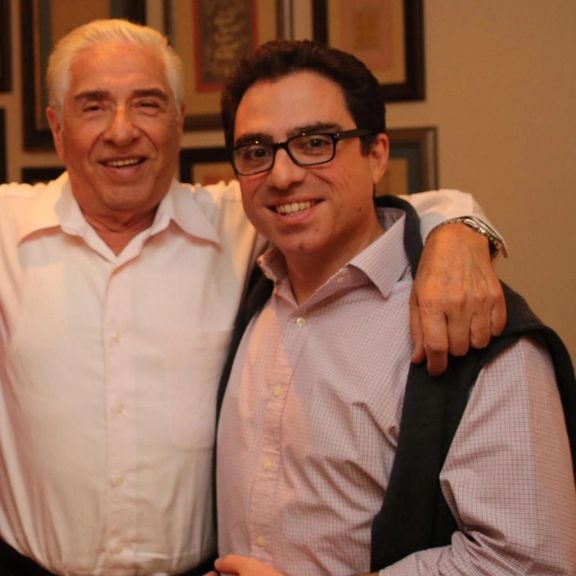
The furlough of Iranian-American citizen Siamak Namazi, who is held hostage in Iran over espionage charges, has been extended for another three days.
Babak Namazi, Siamak's brother, made the announcement in a statement on Saturday, expressing hope that his brother's 10-day leave will lead to his permanent release from prison.
Namazi has spent seven years in jail on trumped-up espionage charges. His father, who went to Iran to free him in 2016, was also arrested and accused of espionage.
Last week, Bagher (Baquer) Namazi, Siamak’s father, finally left Iran after 6.5 years of detention, and Siamak was let out of prison for a furlough. The United States that has been demanding freedom for four citizens held Iran said that Namazi’s release was not part of deal.
Tehran has it will receive $7 billion of its frozen funds for a prisoner exchange deal with the United States, but it did not specifically claim that the money is related to the Namazis.
The United States said last week that reports from Iranian sources of a transfer of funds related to the release of Bagher and the furlough for his son are categorically false.
United Nations spokesperson Stephane Dujarric announced about Namazis in a statement on Saturday, October 1, but the Islamic Republic periodically announces that release of its frozen funds is imminent to prop up its currency.